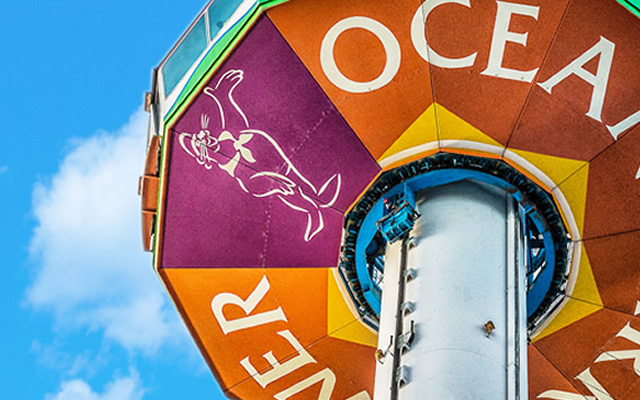Explore what Ocean Park is all about.
Ocean Park of ten-year carbon reduction targets set in 2012 were successfully reached in the 2017/18 fiscal year four years ahead of schedule. The Park has reduced absolute carbon emissions by 10%. Additionally, the Park has installed its first solar power system on the rooftop of Polar Adventure to further improve energy efficiency and promote the development of renewable energy in the community, and is now in active preparation for its next phase to extend application of solar energy to other in-park attractions and facilities.
“Ocean Park strives to achieve sustainable development. Through the Park’s industry-leading carbon footprint reduction plan, we are committed to optimising the energy efficiency of all facilities to achieve energy savings,” said Matthias Li, Chief Executive of Ocean Park. “It’s encouraging to see the Park achieve the set target within six years, which is four years ahead of schedule. The Park will continue to reduce its carbon footprint through various initiatives and create a world-class, eco-friendly theme park experience.” Ocean Park always embraces the ethos of responsible global citizenship and environmental sustainability, and addresses climate change in the Park’s day-to-day operations. Therefore, to minimise the environmental impact of the Park’s operation, a ten-year carbon reduction plan was developed in 2011/12, which aimed to reduce absolute carbon emissions by 10% before 2021/22.
Furthermore, to promote the development of renewable energy in the community, Ocean Park took the lead in participating in HK Electric’s Feed-in Tariff Scheme by installing solar panel systems at Polar Adventure last August at a total cost of HK$3 million. The installed capacity is now around 200 kilowatt-peak (kWp), generating about 200,000 kilowatt-hours (kWh) of electricity annually, which is equivalent to the annual electricity consumption of 50 four-person households.
Right now, the Park is planning for the second phase of the solar power system development, installing systems with a total potential capacity of not less than 700kWp on the rooftops of several of its facilities: The Grand Aquarium, the Waterfront Cable Car Building, the Summit Cable Car Building, the Waterfront Funicular Terminal and the Summit Funicular Building, etc. Site work is planned to commence in the fourth quarter of 2019 and be completed by the end of 2020.
Carbon footprint reduction is an essential element of the Park’s ongoing pursuit of sustainable development, for which Ocean Park has established a Corporate Social Responsibility Policy consisting of seven subgroup policies. Introduced in 2016, the Policy correlates with the United Nations Sustainable Development Goals of Climate Action, Responsible Consumption and Production, Affordable and Clean Energy, Clean Water and Sanitation, Life Below Water and Life On Land, as well as Good Health and Well-being. Among the seven subgroup policies, Environmental Stewardship – defined as the Park’s culture and practices that ensure minimal effects to the natural environment, and the conservation and wise use of natural resources for perpetuity – is integral to the Park’s conservation mission. By achieving a cleaner, safer and more sustainable environment through Environmental Stewardship, the Park strives to contribute to the Paris Agreement on Climate Change and the Hong Kong’s Climate Action Plan 2030+.
The Park fulfils its energy-saving mission through five practices, which include adopting advanced absorption chillers; adopting a four-season setting in different animal exhibits; upgrading light fittings; replacing old facilities with more efficient and energy-saving ones; and raising staff awareness of energy conservation through training and promotions. The Park’s excellent carbon reduction results demonstrate Ocean Park’s responsibility in protecting the environment, and its efforts and commitment to promoting environmental sustainability.
Last but not least, the Park champions conservation education, and partners with various institutions to promote environmental protection and biodiversity through student and public engagement initiatives, awareness-building campaigns, curriculum content, research projects, eco-tours, study tours, etc.
“Ocean Park strives to achieve sustainable development. Through the Park’s industry-leading carbon footprint reduction plan, we are committed to optimising the energy efficiency of all facilities to achieve energy savings,” said Matthias Li, Chief Executive of Ocean Park. “It’s encouraging to see the Park achieve the set target within six years, which is four years ahead of schedule. The Park will continue to reduce its carbon footprint through various initiatives and create a world-class, eco-friendly theme park experience.” Ocean Park always embraces the ethos of responsible global citizenship and environmental sustainability, and addresses climate change in the Park’s day-to-day operations. Therefore, to minimise the environmental impact of the Park’s operation, a ten-year carbon reduction plan was developed in 2011/12, which aimed to reduce absolute carbon emissions by 10% before 2021/22.
Furthermore, to promote the development of renewable energy in the community, Ocean Park took the lead in participating in HK Electric’s Feed-in Tariff Scheme by installing solar panel systems at Polar Adventure last August at a total cost of HK$3 million. The installed capacity is now around 200 kilowatt-peak (kWp), generating about 200,000 kilowatt-hours (kWh) of electricity annually, which is equivalent to the annual electricity consumption of 50 four-person households.
Right now, the Park is planning for the second phase of the solar power system development, installing systems with a total potential capacity of not less than 700kWp on the rooftops of several of its facilities: The Grand Aquarium, the Waterfront Cable Car Building, the Summit Cable Car Building, the Waterfront Funicular Terminal and the Summit Funicular Building, etc. Site work is planned to commence in the fourth quarter of 2019 and be completed by the end of 2020.
Carbon footprint reduction is an essential element of the Park’s ongoing pursuit of sustainable development, for which Ocean Park has established a Corporate Social Responsibility Policy consisting of seven subgroup policies. Introduced in 2016, the Policy correlates with the United Nations Sustainable Development Goals of Climate Action, Responsible Consumption and Production, Affordable and Clean Energy, Clean Water and Sanitation, Life Below Water and Life On Land, as well as Good Health and Well-being. Among the seven subgroup policies, Environmental Stewardship – defined as the Park’s culture and practices that ensure minimal effects to the natural environment, and the conservation and wise use of natural resources for perpetuity – is integral to the Park’s conservation mission. By achieving a cleaner, safer and more sustainable environment through Environmental Stewardship, the Park strives to contribute to the Paris Agreement on Climate Change and the Hong Kong’s Climate Action Plan 2030+.
The Park fulfils its energy-saving mission through five practices, which include adopting advanced absorption chillers; adopting a four-season setting in different animal exhibits; upgrading light fittings; replacing old facilities with more efficient and energy-saving ones; and raising staff awareness of energy conservation through training and promotions. The Park’s excellent carbon reduction results demonstrate Ocean Park’s responsibility in protecting the environment, and its efforts and commitment to promoting environmental sustainability.
Last but not least, the Park champions conservation education, and partners with various institutions to promote environmental protection and biodiversity through student and public engagement initiatives, awareness-building campaigns, curriculum content, research projects, eco-tours, study tours, etc.







